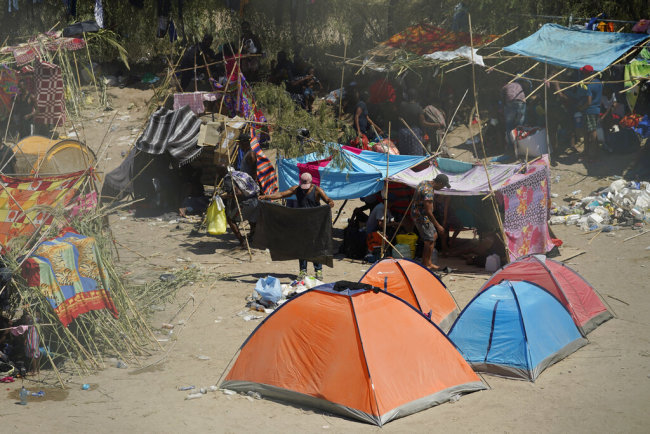Haitians on Texas border undeterred by U.S. plan to expel them
Haitian migrants seeking to escape poverty, hunger and a feeling of hopelessness in their home country said they will not be deterred by U.S. plans to speedily send them back, as thousands of people remained encamped on the Texas border Saturday after crossing from Mexico.

Haitian migrants set up make-shift camp along the Rio Grande after crossing into the United States from Mexico, Friday, Sept. 17, 2021, in Del Rio, Texas. [Photo: AP]
Scores of people waded back and forth across the Rio Grande on Saturday afternoon, re-entering Mexico to purchase water, food and diapers in Ciudad Acuña before returning to the Texas encampment under and near a bridge in the border city of Del Rio.
Junior Jean, a 32-year-old man from Haiti, watched as people cautiously carried cases of water or bags of food through the knee-high river water. Jean said he lived on the streets in Chile the past four years, resigned to searching for food in garbage cans.
"We are all looking for a better life," he said.
The Department of Homeland Security said Saturday that it moved about 2,000 of the migrants from the camp to other locations Friday for processing and possible removal from the U.S. Its statement also said it would have 400 agents and officers in the area by Monday morning and would send more if necessary.
The announcement marked a swift response to the sudden arrival of Haitians and other migrants in Del Rio, a Texas city of about 35,000 people roughly 145 miles (230 kilometers) west of San Antonio. It sits on a relatively remote stretch of border that lacks capacity to hold and process such large numbers of people.
A U.S. official told The Associated Press on Friday that the U.S would likely fly the migrants out of the country on five to eight flights a day, starting Sunday, while another official expected no more than two a day and said everyone would be tested for COVID-19. The first official said operational capacity and Haiti’s willingness to accept flights would determine how many flights there would be. Both officials were not authorized to discuss the matter publicly and spoke on the condition of anonymity.
Told of the U.S. plans Saturday, several migrants said they still intended to remain in the encampment and seek asylum. Some spoke of the most recent devastating earthquake in Haiti and the assassination of President Jovenel Moïse, saying they were afraid to return to a country that seems more unstable than when they left.
"In Haiti, there is no security," said Fabricio Jean, a 38-year-old Haitian who arrived with his wife and two daughters. "The country is in a political crisis."
Haitians have been migrating to the U.S. in large numbers from South America for several years, many having left their Caribbean nation after a devastating 2010 earthquake. After jobs dried up from the 2016 Summer Olympics in Rio de Janeiro, many made the dangerous trek by foot, bus and car to the U.S. border, including through the infamous Darien Gap, a Panamanian jungle.
Jorge Luis Mora Castillo, a 48-year-old from Cuba, said he arrived Saturday in Acuna and also planned to cross into the U.S. Castillo said his family paid smugglers $12,000 to take him, his wife and their son out of Paraguay, a South American nation where they had lived for four years.
Told of the U.S. message discouraging migrants, Castillo said he wouldn't change his mind.
"Because to go back to Cuba is to die," he said.
U.S. Customs and Border Protection closed off vehicle and pedestrian traffic in both directions Friday at the only border crossing between Del Rio and Ciudad Acuña "to respond to urgent safety and security needs" and it remained closed Saturday. Travelers were being directed indefinitely to a crossing in Eagle Pass, roughly 55 miles (90 kilometers) away.